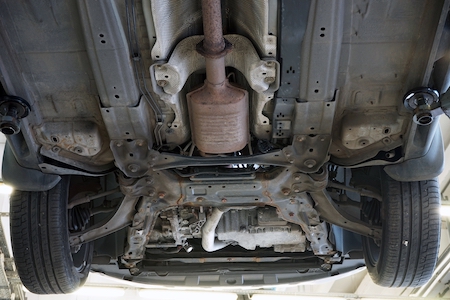Have you heard talk in the media about catalytic converters lately? It’s not a lifestyle piece about what they do for your car. Chances are they’re talking about catalytic converters because of their increasing theft rate.
A recent study shows as of June 2022, there have been more than 26,000 thefts this year, an increase of more than 33 percent from this time last year.
Catalytic converters are an expensive part that are easily removed and stolen. What does a catalytic converter do for your car, and why are they being stolen? Read on. We have the answers you’ll need to keep your catalytic converter safe.
What is a catalytic converter
A catalytic converter is part of your vehicle’s exhaust system. While they come in different shapes and sizes, they are usually about the size of a loaf of bread. You’ll find the catalytic converter in the exhaust system located somewhere between the engine and the muffler. They need high heat to function, so they’ll be located as close to the engine as possible.
The catalytic converter’s job is to convert harmful exhaust pollutants into something less harmful. Through a chemical reaction, toxic hydrocarbons, carbon, monoxide, and nitrogen oxides are converted into carbon dioxide, nitrogen, and water vapor. Though not perfect, the EPA still commends the use of catalytic converters as one of the top inventions so far in the quest to make our air supply cleaner.

Why is catalytic converter theft on the rise
People steal catalytic converters for money. They contain three metals that aid in production of the chemical reaction needed to make pollutants less toxic: platinum, palladium, and rhodium.
The prices of each of these metals have risen steadily over the past decade to make them valuable enough for thieves to take. Platinum, for example, was just above $100 an ounce, moving to an all-time high of over $2,000 an ounce in 2008. It’s settled to around $1,000 today, which still leaves a heavy profit margin to anyone taking it for profit. Because of the value, junkyards are more actively collecting catalytic converters, and have even gone so far as to advertise “mail-in” campaigns making it easy to profit with few questions asked.
States around the US are now passing laws to make catalytic converter purchases traceable, and require proof of ownership when people try to sell them. Without the anonymity protection, it should help reduce theft. But until then, it’s important to know how to protect yours, and what to do if it’s stolen.
Can you drive a car if the catalytic converter has been stolen?
As a general rule, you can drive a car without a catalytic converter. It’s the catalytic converter’s job to lower emission levels and toxic fumes being released into the environment. But it won’t hurt the engine if it’s not in place.
That said, it’s illegal to drive without a catalytic converter in place. That means you’ll fail an emissions test if you don’t have one in place.
You’ll also notice a difference in the way your car performs.
Without a catalytic converter, the oxygen sensors will not operate within the designed range. That sends engine fault codes to diagnostics, engine performance will suffer. Diagnostics will receive a signal from the sensors to change the oxygen mixture to try and reduce emissions. You’ll likely see the check engine light with trouble code P0420.
You’ll notice a reduction in power every time you take your vehicle out on the road for a drive. Without the proper fuel and oxygen mixture, the engine will sputter as it tries to operate. You’ll notice this hesitation each time you take it out.
Your fuel economy will also be compromised, causing you to pull into the gas station more often. Because it impacts the fuel/oxygen mixture, it will push more fuel into the engine trying to accomplish the same action with new requirements. This results in more emissions production and less fuel efficiency.
The exhaust noise will also be louder and raspier without it.
Your car will definitely alert you to the problem.
How to prevent your catalytic converter from being stolen
While the good news is states across the US are putting laws into place to thwart criminal activity, it hasn’t stopped thefts from occurring. It’s harder to instill new laws onto older parts and technology, so it may take a while for rules and policies to catch up.
Until that time, there are things you can do to protect your catalytic converter and reduce the risks of having it stolen.
Catalytic converter replacement can typically cost thousands of dollars, depending on the vehicle. Some high performance vehicles may even have two catalytic converters in place, increasing the replacement cost.
Luckily, there are things you can do to help protect your car’s catalytic converter.
- Park indoors if possible. If you have a garage, use it. It’s the easiest way to deter criminals from destructive behavior.
- Park in a well-lit area. Thieves are less likely to work on a vehicle in a well-lit area, in view of anyone who passes by. A well-lit area with abundant traffic around the location pushes any would-be thief to another location.
- Look for video surveillance. Some places make it well known the area is watched. Thieves want anonymity. If they know they might be observed and recorded, they’ll look for easier targets.
- Consider getting your catalytic converter etched. Many police departments and some auto shops are now etching your license plate number onto the catalytic converter. This will tie any purchase back to the particular theft, and help stop more thefts in the future.
- Have anti-theft devices in place. You can have installed shields that make it more challenging to steal. While not a perfect plan, with little evidence of how effective these are, if you live in a higher crime area, this may be worth trying.
Have you ever had your catalytic converter stolen?
